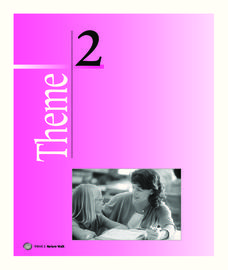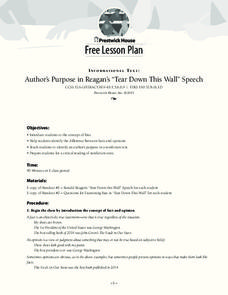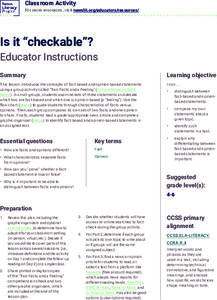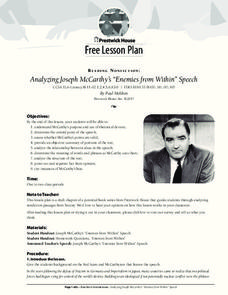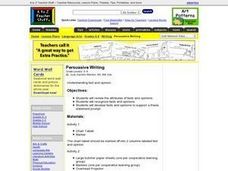Houghton Mifflin Harcourt
Nature Walk: Extra Support Lessons (Theme 2)
Reinforce concepts such as long vowels, spelling patterns, sound clusters, double-final consonants, and syllables with a nature-themed unit. Through a series of extra support lessons, learners compare and contrast using a...
Curated OER
Fact or Opinion?
Third graders design a political cartoon. In this fact and opinion lesson, 3rd graders examine political cartoons and distinguish fact from opinion. Students create a political cartoon on the topic of their choice.
Nasher Museum of Art at Duke University
Are You My Mother? An Opinion Writing Unit
During a five-day lesson, scholars analyze written and visual art—primarily the poem, Mother to Son by Langston Hughes— identify facts, and write opinions. Learners read the poem several times, discuss, write, compare and...
Student Handouts
Five Amazing Facts About...
What are five amazing facts about you? Your best friend? Butterflies? The United States? The possibilities are endless with this worksheet!
News Literacy Project
Fact-Check It!
Here's a lesson designed to help learners develop their digital verification skills. First, expert groups study specific digital verification skills, and in a jigsaw activity, share what they have learned with classmates. The jigsaw...
Prestwick House
Author’s Purpose in Reagan’s “Tear Down This Wall” Speech
President Ronald Reagan's "Tear Down This Wall" speech, delivered on June 12, 1987 before the Berlin Wall, provides class members with an opportunity to examine three key aspects of informational text: author bias, the use of facts and...
Curated OER
Lesson 2: Distinguish Fact from Opinion in Books
An important part of reading informational text is being able to discern fact from opinion. The class reads chapter one from the book, Penguins by Lynn M. Stone. They analyze specific sections of the text to determine if what...
Curated OER
Locating Facts and Opinions in a Newspaper
Fourth graders discuss the difference between fact and opinion. In this language arts lesson, 4th graders search the newspaper and identify factual articles and opinion based articles. Students discuss what makes the article factual or...
Curated OER
The Jacket: Journal Templates Teacher's Guide
Explore this story involving prejudice and racism to enhance learners' comprehension skills. The story The Jacket by Andrew Clements involves an African American boy who is falsely accused of stealing someone's jacket. This teacher's...
Curated OER
Expressing Your Views to the Letter
Analyze the motivation, purpose, and value of letters to the editor by examining letters written in response to the violence at Columbine High School. For homework, middle and high schoolers write their own letters to the editor about an...
Curated OER
Martin Luther King Jr.: A Fact Or Opinion Activity
Learners discuss the difference between fact and opinion, then read a brief biography of Martin Luther King Jr. They complete the Martin Luther King Jr.: Fact or Opinion worksheet.
Curated OER
Distinguishing Facts from Opinions
Third graders use a scavenger hunt worksheet to look through classroom books and resources and identify facts and opinions. In this fact and opinion lesson plan, 3rd graders look through non fiction and fiction books.
Curated OER
Creature Feature Poetry Keyword Search!
Students examine the differences between fact and opinion, and brainstorm ideas for a keyword list by analyzing facts. They listen to poems, and create posters listing three keywords about each creature featured in the poetry.
Curated OER
A Way with Words
How do facts and opinions impact the news? After reading "How to Cover a War" from the New York Times, middle schoolers evaluate the claims in the article. They also consider the media's responsibilities in reporting during wartime....
News Literacy Project
Is It “Checkable”?
Upper elementary scholars test their checking skills with a lesson that challenges them to distinguish between fact and opinion. First, the class takes part in a discussion regarding a helpful flow chart. Next, learners follow the flow...
Curated OER
Reading Comprehension
After listening to a story learners engage in a kinesthetic activity to answer comprehension and critical thinking questions. Finally, the students identify three main facts about the story. Extensions include a fact and opinion...
Curated OER
Fact vs. Opinion
Young scholars explore fact versus opinion in reading material. They listen to sentences and use hand signals to identify if the sentences are facts or opinions. After reading a story, they vote on sentences for facts and opinions and...
Curated OER
Fact or Opinion-Manatees
Students decipher factual information about manatees. In this biological science lesson plan, students research characteristics about manatees. They use that information to separate facts from common opinions about the...
Prestwick House
Reading Nonfiction: Analyzing Joseph McCarthy's "Enemies from Within" Speech
Looking for a lesson that teaches class members how to analyze nonfiction? Use Joseph McCarthy's famous "Enemies from Within" speech as a instructional text. Worksheet questions direct readers' attention to the many historical...
EngageNY
Identifying Author’s Opinion and Evidence: The Value of Sports in People’s Lives, Part II
Context matters! Using the intuitive resource, pupils decipher context clues to determine the meaning of unknown words from an informational text. Also, in small groups, they practice identifying the author's opinion and supporting...
Curated OER
Fact and Opinion Detectives
Third graders see how to distinguish facts from opinions in a child's news magazine. After a lecture/demo, 3rd graders utilize a sample story and a worksheet which gives them practice in distinguishing fact from opinion.
Curated OER
Persuasive Writing: Fact or Opinion
What is the difference between a fact and an opinion? Middle schoolers categorize statements as either facts or opinions before writing a persuasive essay to support a thesis statement they create. This is a great introduction to...
Curated OER
That Is Not My Opinion!
Being an informed citizen requires distinguishing fact from opinion and understanding persuasion methods. Secondary learners evaluate newspaper editorials. They read opinion pieces, identify the writer's purpose and position on an issue,...
Curated OER
Facts and Opinions
In this fact and opinion learning exercise, students decide if statements are facts or opinions, write facts and opinions, and more. Students complete 6 activities.


